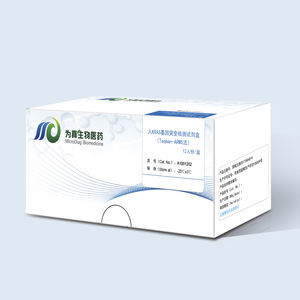
- Laboratory
- Laboratory medicine
- Cancer test kit
- Jiangsu MicroDiag Biomedicine Technology Co., Ltd.

- Products
- Catalogs
- News & Trends
- Exhibitions
ELISA kit DR-70for cancersoncologyfibrinogen
Add to favorites
Compare this product
Characteristics
- Applications
- for cancers
- Application field
- oncology
- Tested parameter
- fibrinogen, for tumor markers
- Sample type
- blood
- Analysis mode
- ELISA
Description
The target of DR-70 detection is the degradation product of serum fibrin in human blood (FDP). FDP is generally broken down by blood clots in a normal human body. When blood vessels are damaged and cause bleeding, fibrinogen in the blood condenses and forms fibrin condensate in the wound, slowing or preventing bleeding. After the wound is healed, the fibrin condensate is broken down again to form FDP. At normal times, the FDP content in the blood is in a relatively stable range. When a malignant tumor occurs in the body, it may lead to abnormal FDP levels in the blood: First, tumor cells may secrete procoagulant substances to activate coagulation, then the corresponding physiological mechanism of the human body will promote the increase of serum FDP concentration; Second, tumor causes normal cell necrosis, plus the death of cancer cells itself leads to the release of a large number of procoagulant substances into the circulatory system; third, immune cells may also release procoagulant substances to cause exogenous coagulation in the process of identifying tumor cells; among them, the increase of procoagulant substances caused by the second and third mechanism will aggravate the progress of the first mechanism and thus increase the FDP in the blood.
[Intended use]
For detection of fibrin in human serum DR-70 content and detection results of leukogen degradation products can be used for auxiliary diagnosis and course monitoring of gastric cancer.
Other Jiangsu MicroDiag Biomedicine Technology Co., Ltd. products
Product display
Related Searches
- Assay kit
- Blood assay kit
- Serum assay kit
- Immunoassay assay kit
- Plasma assay kit
- Molecular test kit
- Optical assay kit
- Fluorescence assay kit
- ELISA assay kit
- Oncology test kit
- Cell assay kit
- Tissue detection kit
- Genetic test kit
- Oncology test kit
- PCR assay kit
- Liver disease assay kit
- Genetic mutation detection kit
- Inflammatory disease assay kit
- Tumor marker assay kit
- Colorectal cancer test kit
*Prices are pre-tax. They exclude delivery charges and customs duties and do not include additional charges for installation or activation options. Prices are indicative only and may vary by country, with changes to the cost of raw materials and exchange rates.






